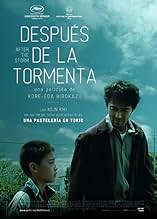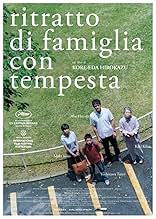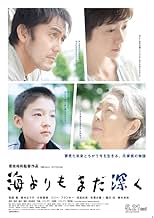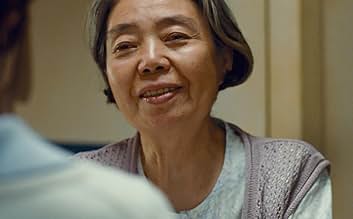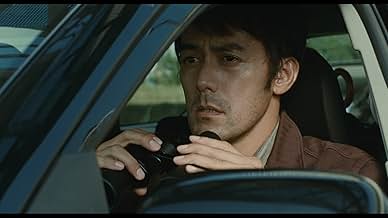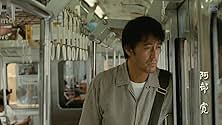IMDb RATING
7.4/10
14K
YOUR RATING
After the death of his father, a private detective struggles to find child support money and reconnect with his son and ex-wife.After the death of his father, a private detective struggles to find child support money and reconnect with his son and ex-wife.After the death of his father, a private detective struggles to find child support money and reconnect with his son and ex-wife.
- Awards
- 2 wins & 13 nominations total
Featured reviews
Remarkable consistency in delivering great dramas. If you are a drama film fan without the language barrier, then you must have seen at least a couple of films of Hirokazu Koreeda. Less than a year ago I saw his new arrival 'Our Little Sister'. Despite not overwhelmingly impressed with that, I won't say that I did not enjoy it. I always fascinated with the realistic portrayal, but the points should be executed so well than leaving empty scenes and dialogues, and calling it an art film. This one was much better. The first impression was okay, but after giving some time between my watch and writing this review, I kind of started to like it more.
First of all, this story was not new for me. I have already seen a few similar themed films from other parts of the world, particularly in Hollywood. But none of them were as serious as this one while narrating its tale. The storyline was simple, entirely focused on a family, fighting on stumbling marriage. It was a long introduction, particularly aimed at a father, like how he messed up in his life with gambling. But opening few minutes made him look like a man of example. Only in the following event you would know how deep his troubles are.
Other than his family, his work field was introduced to us. Being a writer, but for a few quick bucks working as a private eye on his part time, he misuses the opportunity with his loyal friend. Once the film reaches the half way mark, the focus shifts back to the family where the remaining story takes place. It was a stormy day and they all gather in his mother's apartment. This is where everything will be cleared out, whether the marriage will be saved or not. But the mother's one final push as it seems planned perfectly, would it deliver a result is what you should watch it to learn.
❝I wonder why it is that men can't love the present. Either they just keep chasing whatever it is they've lost, or they keep dreaming beyond their reach.❞
You can't doubt Hiroshi Abe's presence. He was perfect along with Kirin Kiki, whose a few films I've seen before, but only started to notice recently with her amazing performance from 'Sweet Bean'. The casting looked great, and the locations. I always like films about elderly people, especially to highlight their struggle. And most of the Japanese films I have seen on that concept were just like the way I wanted. Maybe because there are lots of aging people in Japan than anywhere else. Just kidding.
Obviously dialogues are very important for a film and there were many good lines spoken. At one point in the final stage, it flips towards sentiments. Very touching conversation, particularly coming from an old and experienced woman, which is definitely worth taking heed. This is a family film. Despite about a marriage crisis, there is no speculation, like twist and turns. Interesting enough with its plain narration. True to its title and when the title part comes into play, that's where it gets its peak. With its nearly two hours runtime, the pace was acceptable, but patience needed for those got trouble with long films.
This is the film about our life, that we can try for what we want to be, but achieving it not easy, not everybody would succeed that. Accepting the fact, as life my go on was the message. Incredible writing and direction. Feels like straight out of a book, it's an original screenplay though. Surely you don't want to miss this film, from this director. Because if you do, it is equal to failing to watch the latest Woody Allen film. Only he's a Japanese version. My final words are the director already made his masterpiece(s), but still it is near to one compared to the international cinemas. So I'm not saying it is a must, but surely worth a try.
7½/10
First of all, this story was not new for me. I have already seen a few similar themed films from other parts of the world, particularly in Hollywood. But none of them were as serious as this one while narrating its tale. The storyline was simple, entirely focused on a family, fighting on stumbling marriage. It was a long introduction, particularly aimed at a father, like how he messed up in his life with gambling. But opening few minutes made him look like a man of example. Only in the following event you would know how deep his troubles are.
Other than his family, his work field was introduced to us. Being a writer, but for a few quick bucks working as a private eye on his part time, he misuses the opportunity with his loyal friend. Once the film reaches the half way mark, the focus shifts back to the family where the remaining story takes place. It was a stormy day and they all gather in his mother's apartment. This is where everything will be cleared out, whether the marriage will be saved or not. But the mother's one final push as it seems planned perfectly, would it deliver a result is what you should watch it to learn.
❝I wonder why it is that men can't love the present. Either they just keep chasing whatever it is they've lost, or they keep dreaming beyond their reach.❞
You can't doubt Hiroshi Abe's presence. He was perfect along with Kirin Kiki, whose a few films I've seen before, but only started to notice recently with her amazing performance from 'Sweet Bean'. The casting looked great, and the locations. I always like films about elderly people, especially to highlight their struggle. And most of the Japanese films I have seen on that concept were just like the way I wanted. Maybe because there are lots of aging people in Japan than anywhere else. Just kidding.
Obviously dialogues are very important for a film and there were many good lines spoken. At one point in the final stage, it flips towards sentiments. Very touching conversation, particularly coming from an old and experienced woman, which is definitely worth taking heed. This is a family film. Despite about a marriage crisis, there is no speculation, like twist and turns. Interesting enough with its plain narration. True to its title and when the title part comes into play, that's where it gets its peak. With its nearly two hours runtime, the pace was acceptable, but patience needed for those got trouble with long films.
This is the film about our life, that we can try for what we want to be, but achieving it not easy, not everybody would succeed that. Accepting the fact, as life my go on was the message. Incredible writing and direction. Feels like straight out of a book, it's an original screenplay though. Surely you don't want to miss this film, from this director. Because if you do, it is equal to failing to watch the latest Woody Allen film. Only he's a Japanese version. My final words are the director already made his masterpiece(s), but still it is near to one compared to the international cinemas. So I'm not saying it is a must, but surely worth a try.
7½/10
Most films these days do not have something to 'say' anymore. They don't have a deeper meaning. And if they do, it's mostly superficial or so complex you don't really understand. 'After the Storm' by Hirokuzu Kore-eda has something to say, it's like a condensed moment of life. You will be dumbstruck by it's beauty.
The story deals with Ryota, struggling with financial problems, and trying to keep contact with his son after divorcement. He works as a private detective, spying on affairs and looking for lost cats while his real passion lies in writing literature.
The entire film is built around a central story part where they take shelter from a taifun, it involves scenes of such profound beauty, you will be moved to tears. The beauty lies in the things that are not spoken out, yet linger in the air like rain: the missed opportunities to be happy, love gone by and yet - still there.
To say the film deals with abandoned dreams in the face of reality is wrong, it's the contrary. The film says: If you keep waiting for beauty in life, you will not realize that it has already arrived. Just not the way you thought it would.
The story deals with Ryota, struggling with financial problems, and trying to keep contact with his son after divorcement. He works as a private detective, spying on affairs and looking for lost cats while his real passion lies in writing literature.
The entire film is built around a central story part where they take shelter from a taifun, it involves scenes of such profound beauty, you will be moved to tears. The beauty lies in the things that are not spoken out, yet linger in the air like rain: the missed opportunities to be happy, love gone by and yet - still there.
To say the film deals with abandoned dreams in the face of reality is wrong, it's the contrary. The film says: If you keep waiting for beauty in life, you will not realize that it has already arrived. Just not the way you thought it would.
There are not many directors whose films I greet with enthusiasm, let alone Japanese ones. I think Hirokazu Koreeda is the only one. His films are a different breed - simple in design, but brilliant in architecture and sublime in closure.
Koreeda is the leading exponent in contemplative cinema. Under his minimalist approach, the essence of familial life and couplehood is distilled into abstract thoughts lingering like warm tendrils wrapped around your mind. The movie may be over but it refuses leave the confines of your consciousness and you would want to surrender to its warm lull again. The tone of After the Storm is pitch-perfect - nobody screams in your face, there are no pointing fingers, no low brow soap-opera. The acting is exquisite and nuanced. What is not said speaks louder than what is uttered. There is humour of the familiar kind; it is the kind of humour you laughed heartily because it is so familiar and you recognise the situations because you have gone through them before. There are not many filmmakers who are as sensitive as Koreeda. Above all else, this is a director who listens to characters' inner thoughts and emotions like an old master piano tuner and he knows how to calibrate the performances for everlasting emotional heft. For Koreeda, it is always about the small moments leading to the big truths.
After the Storm is not one of Koreeda's best films (it needlessly took too long to establish Ryota's character) but it easily transcends way above all the flashy films that inundate our cinemas like ants to candies. I wish I had a notebook last night because some of the metaphors are amazing. Here is one, asseverated by the grandmother Yoshiko, "The longer a stew sits, the more flavour it develops, just like people."
Koreeda is the leading exponent in contemplative cinema. Under his minimalist approach, the essence of familial life and couplehood is distilled into abstract thoughts lingering like warm tendrils wrapped around your mind. The movie may be over but it refuses leave the confines of your consciousness and you would want to surrender to its warm lull again. The tone of After the Storm is pitch-perfect - nobody screams in your face, there are no pointing fingers, no low brow soap-opera. The acting is exquisite and nuanced. What is not said speaks louder than what is uttered. There is humour of the familiar kind; it is the kind of humour you laughed heartily because it is so familiar and you recognise the situations because you have gone through them before. There are not many filmmakers who are as sensitive as Koreeda. Above all else, this is a director who listens to characters' inner thoughts and emotions like an old master piano tuner and he knows how to calibrate the performances for everlasting emotional heft. For Koreeda, it is always about the small moments leading to the big truths.
After the Storm is not one of Koreeda's best films (it needlessly took too long to establish Ryota's character) but it easily transcends way above all the flashy films that inundate our cinemas like ants to candies. I wish I had a notebook last night because some of the metaphors are amazing. Here is one, asseverated by the grandmother Yoshiko, "The longer a stew sits, the more flavour it develops, just like people."
Fear that your children may mimic your worst qualities is the driving force in Hirokazu Koreeda's ("Our Little Sister") After the Storm (Umi yori mo mada fukaku), a compassionate look at the struggles of a Japanese family. Its title derived from the lyrics of an old pop song, the film is set in Kiyose, a city near Tokyo where it is beautifully shot in the housing compound where Koreeda grew up by cinematographer Yutaka Yamasaki. Ryota Shinoda (Hiroshi Abe, "Everest: The Summit of the Gods") is a novelist who has not had a story published in fifteen years and is forced to work for a private detective agency, which he claims is solely to do research for his next novel. Using his detective job to spy on Kyoko's new boyfriend with the help of his young detective-partner (Sosuke Ikematsu, "Mubansô"), he learns that she is dating a wealthy businessman who is intrusive in Shingo's life.
A gambling addict who squanders much of his earnings, Ryota's relationship with his young son Shingo (Taiyo Yoshizawa) is in jeopardy as his ex-wife Kyoko Shiraishi (Yoko Maki, "Like Father, Like Son") threatens to keep him from seeing Shingo until he catches up on his child support payments. The first time we see Ryota we are not impressed. He is going through his recently deceased father's private belongings to see if he can find anything that he could sell. It seems, however, that his father was also a gambler and Ryota's search might have been better conducted at the local pawn shop. While it is clear that he is not a role model for parenting, Ryota is man of considerable charm and Koreeda does not stand in judgment of his actions but depicts his travails with warmth and humor. We see that in spite of his dubious habits, his sister (Satomi Kobayashi) and his employer are both willing to lend him money.
With the help of his own mother, the spunky and very astute Yoshiko (Kirin Kiki, "Our Little Sister"), Ryota has his sights set on reuniting with Kyoko and Shingo. His love for his son is very real but he seems incapable of breaking from his demons, the same ones that dominated his father's life. Attempting to win back Shingo's love, he takes him out for a hamburger, buys him new shoes, and visits Yoshiko, the boy's beloved grandmother. Knowing that a typhoon is on the way, the family comes together to spend the night and to wrestle with the direction that their lives will take. "Why can't men ever love the present," Yoshiko wonders, highlighting an important message of the film, that people must accept the reality of how they really are.
While there is truth to the idea that we must accept who we are, there is a thin line between accepting your limitations and recognizing that you have the power to transform your life, to live the life you want rather than the life you are resigned to. Also, while the idea that sons will always take after their father is accepted without question, the reality in my experience is that sons will either take after their fathers or make very sure that they do not. After the Storm is one of Koreeda's best films and, as always, he elicits exceptional performances from children as well as brilliant takes by Kiki and Hiroshi Abe, but, in my view, its message is debatable.
A gambling addict who squanders much of his earnings, Ryota's relationship with his young son Shingo (Taiyo Yoshizawa) is in jeopardy as his ex-wife Kyoko Shiraishi (Yoko Maki, "Like Father, Like Son") threatens to keep him from seeing Shingo until he catches up on his child support payments. The first time we see Ryota we are not impressed. He is going through his recently deceased father's private belongings to see if he can find anything that he could sell. It seems, however, that his father was also a gambler and Ryota's search might have been better conducted at the local pawn shop. While it is clear that he is not a role model for parenting, Ryota is man of considerable charm and Koreeda does not stand in judgment of his actions but depicts his travails with warmth and humor. We see that in spite of his dubious habits, his sister (Satomi Kobayashi) and his employer are both willing to lend him money.
With the help of his own mother, the spunky and very astute Yoshiko (Kirin Kiki, "Our Little Sister"), Ryota has his sights set on reuniting with Kyoko and Shingo. His love for his son is very real but he seems incapable of breaking from his demons, the same ones that dominated his father's life. Attempting to win back Shingo's love, he takes him out for a hamburger, buys him new shoes, and visits Yoshiko, the boy's beloved grandmother. Knowing that a typhoon is on the way, the family comes together to spend the night and to wrestle with the direction that their lives will take. "Why can't men ever love the present," Yoshiko wonders, highlighting an important message of the film, that people must accept the reality of how they really are.
While there is truth to the idea that we must accept who we are, there is a thin line between accepting your limitations and recognizing that you have the power to transform your life, to live the life you want rather than the life you are resigned to. Also, while the idea that sons will always take after their father is accepted without question, the reality in my experience is that sons will either take after their fathers or make very sure that they do not. After the Storm is one of Koreeda's best films and, as always, he elicits exceptional performances from children as well as brilliant takes by Kiki and Hiroshi Abe, but, in my view, its message is debatable.
After The Storm is an absolutely brilliant film, as it deals with the trials and tribulations of a father & perceived loser in the face of challenging life circumstances. Hiroshi Abe plays the role of Shinoda Ryota, a detective that is financially broke, divorced and living in the illusion of his past glory as an award winning author. He struggles to make ends meet and often resorts to gambling, stealing and backhand deals that involves extortion in order to support himself and to pay child support for his only son, Shingo.
Another eye-catching performance to look put for is by Ryota's mom, Yoshiko, played by Kirin Kiki. She absolutely nails the role of a bewildered, lonely and regretful single grandmother, often dwelling on the unfortunate circumstances of the past and blaming her late husband for how her son turned out. She provides most of the comedic moments in the movie, as her tendency to be over-bearing and cheapskate at times, will make you giggle in the very least. She also seems obsessed and resigned to the idea that she will die alone, hence she keeps requesting her son & daughter to keep her company as much as possible. On top of that, she also harbors the faint hope that her son can be re-united with his ex-wife, and tries to set them up to sleep together during a night of storm.
Overall, the theme of After the Storm is dealing with the present circumstances in the face of unrealized dreams and broken hopes. This theme is strong in the characters of Ryota and Yoshiko. Additionally, Ryota's ex-wife, Kyoko (played by Yoko Maki) also plays an important role as she embodies the person whom manages to focus her life solely in the present times. Whilst Ryota still perceives himself as the father responsible for Shingo's journey through his current childhood phase, Kyoko has moved on and has accepted the fact that Ryota was never cut out to be a responsible father. She has even found a new boyfriend and except for the monthly visit, would rather Shingo not be spending time with his actual dad.
What really catches the eye about this movie, is that even in a fully developed country like Japan, with is high standards of living and apparent high-culture, there exists people like Ryota; someone who is left behind by the fast-moving economy and rebels against the norm of participating in the corporate rat-race to succeed career-wise. He can be pictured as someone who is very defensive whenever questioned on his life choices and habits. However, just like a starry-eyed young graduate, Ryota had dreams of his own for a stable government job, which somehow never came to be. However, the pride in him never dissolves, as the once Award-winning author still feels he deserves recognition for his past work.
Another eye-catching performance to look put for is by Ryota's mom, Yoshiko, played by Kirin Kiki. She absolutely nails the role of a bewildered, lonely and regretful single grandmother, often dwelling on the unfortunate circumstances of the past and blaming her late husband for how her son turned out. She provides most of the comedic moments in the movie, as her tendency to be over-bearing and cheapskate at times, will make you giggle in the very least. She also seems obsessed and resigned to the idea that she will die alone, hence she keeps requesting her son & daughter to keep her company as much as possible. On top of that, she also harbors the faint hope that her son can be re-united with his ex-wife, and tries to set them up to sleep together during a night of storm.
Overall, the theme of After the Storm is dealing with the present circumstances in the face of unrealized dreams and broken hopes. This theme is strong in the characters of Ryota and Yoshiko. Additionally, Ryota's ex-wife, Kyoko (played by Yoko Maki) also plays an important role as she embodies the person whom manages to focus her life solely in the present times. Whilst Ryota still perceives himself as the father responsible for Shingo's journey through his current childhood phase, Kyoko has moved on and has accepted the fact that Ryota was never cut out to be a responsible father. She has even found a new boyfriend and except for the monthly visit, would rather Shingo not be spending time with his actual dad.
What really catches the eye about this movie, is that even in a fully developed country like Japan, with is high standards of living and apparent high-culture, there exists people like Ryota; someone who is left behind by the fast-moving economy and rebels against the norm of participating in the corporate rat-race to succeed career-wise. He can be pictured as someone who is very defensive whenever questioned on his life choices and habits. However, just like a starry-eyed young graduate, Ryota had dreams of his own for a stable government job, which somehow never came to be. However, the pride in him never dissolves, as the once Award-winning author still feels he deserves recognition for his past work.
Did you know
- TriviaAlbeit released later, this film wrapped earlier than Koreeda's previous film Notre petite soeur (2015). The month-and-a-half filming of After the Storm took place starting in May 2014 in between the production of Our Little Sister, which was shot throughout a year.
- Quotes
Shinoda Yoshiko: I wonder why it is that men can't love the present. Either they just keep chasing whatever it is they've lost... or they keep dreaming beyond their reach.
- ConnectionsReferences Mon voisin Totoro (1988)
- SoundtracksShinkokyû
Music and lyrics by Takashi Nagazumi
Performed by Hanaregumi
Courtesy of Victor Records and Speedstar Records
- How long is After the Storm?Powered by Alexa
Details
- Release date
- Country of origin
- Official site
- Language
- Also known as
- After the Storm
- Filming locations
- Kiyose, Tokyo, Japan(Train station)
- Production companies
- See more company credits at IMDbPro
Box office
- Gross US & Canada
- $272,132
- Opening weekend US & Canada
- $27,880
- Mar 19, 2017
- Gross worldwide
- $5,382,886
- Runtime1 hour 58 minutes
- Color
- Sound mix
- Aspect ratio
- 1.85 : 1
Contribute to this page
Suggest an edit or add missing content



